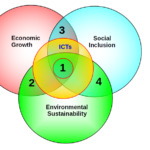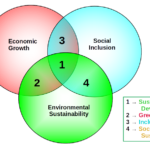August this year will mark the 20th anniversary of the official launching of the World Wide Web, less than a year after the 2nd LDC conference held in Paris in 1990. Back then, 47 countries in the globe were classified as LDCs and, not surprisingly, none of them were connected to the Internet. It was only until the end of the last Millennium that all LDCs were able to join the global network, although internal challenges to achieve universal access to the new Information and Communication Technologies (ICTs) still remain today.
Perhaps a more impressive feat is what has happened with the diffusion of mobile technologies in the developing world in the last 5 to 7 years. The penetration of mobile phones was not only unforeseen by many of the experts in the field of ICT for development but is has also surpassed any expectations. And LDCs are part of this dramatic evolution. Indeed, it is the first time in history that a technology spreads so fast to so many people in so many countries.
But we have not gathered here to only talk about ICTs. If we take the evolution of the Internet and the explosive growth of mobile technologies together, can they promote human development in the LDCs? And if so, how can we harness them to really make a dent in the socio-economic and political gaps that LDCs still confront today? These are some of the issues this session will address. Allow me to make a few short remarks on this.
We at UNDP have been supporting the use of ICTs in development for almost 20 years now and in over 100 developing countries. Based on this experience, we have come to see ICTs not as a goal in themselves but rather as a catalyst that can enable most development processes and targets. ICTs are, if you wish, the dependent variable. Let us not lose sight of this.
With this in mind, we must make sure that those of us who champion ICTs in development do not end adding yet another issue to the already busy policy agendas of LDCs. Many of these countries are already struggling to keep up with international agendas that require their undivided attention to just be part of the global dialog. If ICTs are to make a difference in human development then they must be part and parcel of both current development agendas and internationally agreed development goals (IADGs).
Democratic or good governance is one of the areas where ICTs are usually ignored or, in the best cases, totally underestimated. Current events in the Middle East where both Internet and mobiles have played a role (although not a pivotal one!) serve as a reminder of how the new tools can provide voice to citizens and stakeholders. If we, so to speak, transpose the lens and instead look at this phenomena from the government’s viewpoint, we will then see that supply -what governments and their partners offer to people, can now more easily match demand, -what the people in specific communities need.
In effect, new tools such as social media and related allow to capture and aggregate voice in a large scale and on a cost effective fashion. This in turn will lead to public investments, say the provision of basic services to the poorest sector of the population in LDCs, that can indeed be more effective and responsive as it will directly address the priorities of people, thus fostering human development.
Innovation is another critical area for LDCs where ICTs can also be a critical catalyst. The global economy has also undergone dramatic changes in the last 20 years and there is now a large market for services and knowledge products (like software and applications). In fact, several LDCs such as Bangladesh, Mozambique and Rwanda, to name a few, are fully aware of this and have launched national policies and medium to long term programmes to become global players in this area.
And local innovation is critical to make this happen. LDCs should not see themselves as just consumers of technology. They can also become producers of technology and in doing so be able to develop local innovations that can cater to the primary needs of the poor and marginalized, women and youth included.
The other important change that we can see at the global level, is the key role that the so-called emerging economies (Brazil, China, India, Russia, South Africa, BRICS) are playing at that level. Many if not all of these countries still have human development gaps that require their attention. In this light, these group of countries are developing technologies and innovative solutions that can also be utilized utilized in LDCs. Today, perhaps more than ever, South South cooperation s becoming critical for poor countries that cannot afford to look anywhere else if they really want to leap-frog well into the 21st century.
All in all, one thing is for sure: ICTs alone will not be able to engender all these transformations. Both governments, through policies and investments, and people, through voice and participation, need to be engaged, and work closely together to bring the benefits of human development to every single person living in LDCs.





